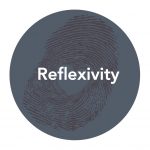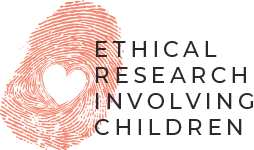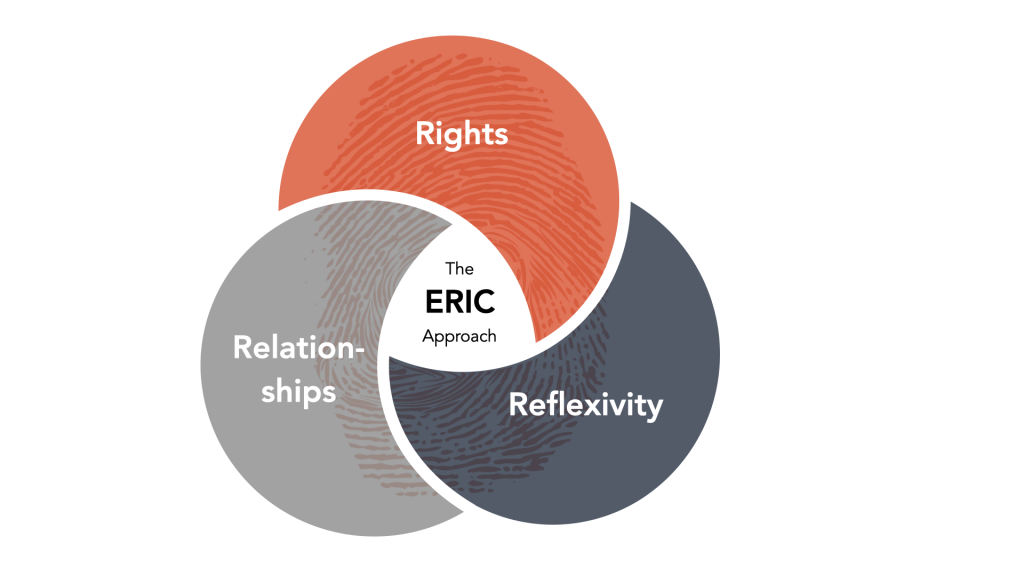Philosophy
You can download a pdf of the complete ERIC Philosophy in English, français, español, 한국어, Türkçe and Bahasa Indonesia.
The overall purpose of the ERIC project is to journey with researchers as they pursue and refine research approaches that upholds the rights, dignity and wellbeing of children. ERIC assumes that ethics is much more than procedural compliance with a prescribed set of rules or code of conduct that can deliver good or safe research in any given context. While such codes play an important role, the ERIC approach recognises the many ways in which researchers’ own knowledge, beliefs, assumptions, values, attitudes and experience intersect with ethical decision-making. As such, ERIC requires critical reflection; cross-cultural, inter-sectoral and cross-disciplinary dialogue; context-specific problem-solving; and international collaboration, learning and engagement.
The ERIC approach is guided by the core ethical principles of respect, benefit and justice.
It is also underpinned by the ERIC framework of ‘Three Rs’: rights, relationships and reflexivity (Powell, Graham & Truscott, 2016).
Understanding the ERIC Framework of Three Rs
 Children’s rights, as laid out in the 54 articles of the United Nations Convention of the Rights of the Child (UN, 1989), are the foundation of the ERIC approach. As a starting point, Ennew and colleagues (2009; Beazley, Bessell, Ennew & Waterson, 2009) combined four articles of the UNCRC to articulate children’s ‘right to be properly researched’. The emphasis on children’s rights in ERIC highlights their central place in ethical research, along with advancing the status of children through their appropriate involvement.
Children’s rights, as laid out in the 54 articles of the United Nations Convention of the Rights of the Child (UN, 1989), are the foundation of the ERIC approach. As a starting point, Ennew and colleagues (2009; Beazley, Bessell, Ennew & Waterson, 2009) combined four articles of the UNCRC to articulate children’s ‘right to be properly researched’. The emphasis on children’s rights in ERIC highlights their central place in ethical research, along with advancing the status of children through their appropriate involvement.
 The second R, relationships, recognises the reality that the practice of research ethics is negotiated within relationships. Ethical issues and challenges arise in the space between researchers, research organisations, children, parents/caregivers/guardians, communities and others involved in the research process (Powell et al. 2011; 2012), as terms such as ‘situational ethics’, ‘situated ethics’, ‘in-situ ethics’, ‘everyday ethics’, ‘ethically important moments’ and ‘ethics in practice’ seek to recognise. An emphasis on relationships also highlights the opportunities for creativity and expansiveness that ultimately promote and strengthen children’s well-being, dignity and rights.
The second R, relationships, recognises the reality that the practice of research ethics is negotiated within relationships. Ethical issues and challenges arise in the space between researchers, research organisations, children, parents/caregivers/guardians, communities and others involved in the research process (Powell et al. 2011; 2012), as terms such as ‘situational ethics’, ‘situated ethics’, ‘in-situ ethics’, ‘everyday ethics’, ‘ethically important moments’ and ‘ethics in practice’ seek to recognise. An emphasis on relationships also highlights the opportunities for creativity and expansiveness that ultimately promote and strengthen children’s well-being, dignity and rights.
It should be noted that in ethical theory, relational ethics has often been considered at odds with rights-based understandings of ethics (see Truscott, Graham & Powell, 2019). However, the ERIC approach bridges the differences, encouraging researchers to consider how children’s rights might be best upheld in a given relational or situational context. Doing so, requires the third R of the framework, reflexivity.
 Reflexivity encompasses pre-emptive consideration of ethical tensions at the planning stage and critical engagement with ethical decision-making as issues arise in practice (Powell, Graham & Truscott, 2016). A useful conceptual proxy for reflexivity is the idea of ‘ethical mindfulness’ (Warin, 2011). This helps to highlight that reflexivity differs from reflection. Reflexivity should also provoke researchers to question their assumptions and beliefs about childhood and about the role and place of children in society (Bourdieu & Wacquant, 2005; Gildersleeve, 2010; Powell, Graham & Truscott, 2016).
Reflexivity encompasses pre-emptive consideration of ethical tensions at the planning stage and critical engagement with ethical decision-making as issues arise in practice (Powell, Graham & Truscott, 2016). A useful conceptual proxy for reflexivity is the idea of ‘ethical mindfulness’ (Warin, 2011). This helps to highlight that reflexivity differs from reflection. Reflexivity should also provoke researchers to question their assumptions and beliefs about childhood and about the role and place of children in society (Bourdieu & Wacquant, 2005; Gildersleeve, 2010; Powell, Graham & Truscott, 2016).
In summary, the ERIC approach:
- views children and young people as persons in their own right and as worthy and capable of recognition, respect and voice in research;
- acknowledges the right of children and young people to have a say and to be heard, as afforded to them under the United Nations Conventions on the Rights of the Child (UNCRC);
- assumes children’s involvement in any kind of research takes place in partnership with caring, skilled adults who need to provide appropriate support and guidance;
- underlines the importance of research focused on understanding and improving children’s lives and circumstances across all contexts;
- engages critically with well-attested ethical principles of respect, benefit and justice; and
- promotes the importance of dialogue and a more reflexive approach in attending to the complex ethical issues that can emerge with research involving children.



